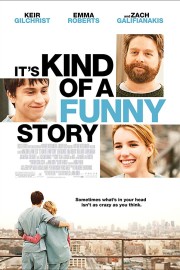It’s Kind of a Funny Story
“It’s Kind of a Funny Story” has three terrific performances and a story that hits at a lot of truths when it comes to anxiety and mental disorders. All too often, however, the film goes for “One Flew Over the Cuckoo’s Nest” silliness that just seems out of place. But maybe that’s just coming from someone for whom the film’s story hits a little too close to home emotionally.
Keir Gilchrist stars as Craig, a 16-year-old in New York who’s been dreaming of suicide. One Sunday morning, his dream, in which he tries to jump off the Brooklyn Bridge, is interrupted by his parents. He realizes the selfishness of his reasons and goes to the ER to get himself checked out. He ends up in 3 North, the hospital’s psychiatric ward. When what he sees there frightens him into trying to get discharged, Dr. Minerva (Viola Davis) tells him he must stay a minimum of 5 days. His family (including mother Laura Graham, and father Jim Gaffigan) is supportive and concerned; his friends (including Thomas Mann’s Aaron and Zoe Kravitz’s Nia) have their own reasons for worry. But it will be the people Craig meets in 3 North over these five days that will have the most sustaining impact.
The film is adapted from Ned Vizzini’s novel by Anna Boden & Ryan Fleck, who previously made splashes as the writer-director team behind “Sugar” and “Half Nelson,” the latter notable for Ryan Gosling’s shattering, Oscar-nominated performance as a drug-taking teacher. I wouldn’t look for Oscar buzz for anyone here, although Gilchrist nails Craig’s fear of where his anxiety and depression might lead him; Emma Roberts is a lovely and lively pleasure as Noelle, a fellow juvenile patient who strikes up a smitten bond with Craig; and Zach Galifianakis is broadly funny as Bobby, a grown man on one of many “vacations” from life. All three are engaging and have fine support in the cast of characters around them, but that’s ultimately where the film loses me. It fails to treat too many of these supporting characters with much dignity, instead looking for an easy punchline too often. Still, when the movie does hit on something real and true about depression, anxiety, and the social embarrassments that can cripple even more than the feelings themselves do, it does have something genuine to say. I just wish it didn’t undercut that authenticity with painful cliche.










